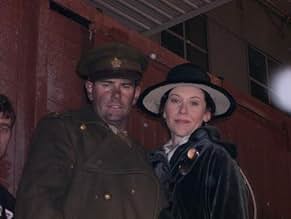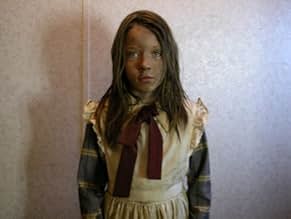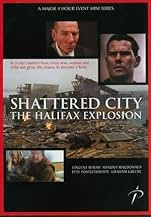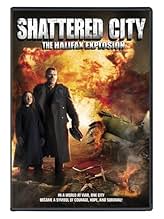A true story about the tragic explosion at Halifax Harbour, Canada, in the early hours of December 6, 1917.A true story about the tragic explosion at Halifax Harbour, Canada, in the early hours of December 6, 1917.A true story about the tragic explosion at Halifax Harbour, Canada, in the early hours of December 6, 1917.
- Awards
- 8 wins & 6 nominations total
Browse episodes
Storyline
Did you know
- Trivia1,951 people were killed
- GoofsThe folding camera used for the family portrait is a type not made until the mid-30s. Nor in 1917 would there have been a self timer or a flash bulb. If the flash was supposed to have been done with flash powder(which was used at that time) it is unlikely an amateur would have it and it certainly could not have been set off by a self timer, even if one existed.
- Crazy creditsThis film is dedicated to the spirit and the memory of Constance "Connie" Bond Young August 9, 1911 - February 22, 2003
- ConnectionsFollowed by City of Ruins: The Halifax Explosion (2003)
Featured review
My commentary: First and foremost, while the emphasis was on human error in the movie, the fact is war is a very fertile breeding ground for accidents on top of the deliberate carnage. "Saving Private Ryan" noted this with the mention of the glider that was fitted with armor plating - but no one thought to tell the pilot. So it crashes and six soldiers are killed needlessly. Accounts of war proliferate in tragic incidents such as that one. The Halifax Explosion must be the biggest war-related accident in history.
The Great War featured incomprehensibly vast usage of artillery shells, and artillery shells need TNT and other explosives. A lot of this had to be imported from the U.S., and by ships. Ships had to be gathered in ports. Ports will then see a lot of ships coming and going, and harbor masters are going to be pressed to keep all this traffic moving. The odds were considerable something like the incident of Dec. 6th, 1917 would happen someplace in Allied ports sooner or later.
Captain Le Medec probably wasn't the greatest or bravest mariner of all time. But how many ship captains who have seniority or pull are going to agree to captain a massive floating bomb at the height of the U-boat menace? Second, did anyone notice that the movie exonerates harbor pilot Mackie while making Le Medec and the Belgian captain look like total dolts at the helm; and has Mackie trying to avert disaster while the Frenchman funks off with his crew? Considering it is a Canadian and not a French production, what a surprise.
Then there is the almost defeatist speech Capt. Collins gives to the war rally in the church. Excuse me, an *officer* in HM forces blurting out like that? It simply wouldn't have happened at the time. Contrary to what he later tells Barbara, Germans weren't close to suing for peace at the time, and the war wasn't kept going only because the Allies wanted another year of war profits. Indeed, with the Western Front stalemated and Russia close to surrender, Ludendorff et al were convinced victory for Germany was just around the corner. And a lot of people on the Allied side feared the same thing.
On the plus side, I was impressed by what the production did with a limited CBC budget.
The Great War featured incomprehensibly vast usage of artillery shells, and artillery shells need TNT and other explosives. A lot of this had to be imported from the U.S., and by ships. Ships had to be gathered in ports. Ports will then see a lot of ships coming and going, and harbor masters are going to be pressed to keep all this traffic moving. The odds were considerable something like the incident of Dec. 6th, 1917 would happen someplace in Allied ports sooner or later.
Captain Le Medec probably wasn't the greatest or bravest mariner of all time. But how many ship captains who have seniority or pull are going to agree to captain a massive floating bomb at the height of the U-boat menace? Second, did anyone notice that the movie exonerates harbor pilot Mackie while making Le Medec and the Belgian captain look like total dolts at the helm; and has Mackie trying to avert disaster while the Frenchman funks off with his crew? Considering it is a Canadian and not a French production, what a surprise.
Then there is the almost defeatist speech Capt. Collins gives to the war rally in the church. Excuse me, an *officer* in HM forces blurting out like that? It simply wouldn't have happened at the time. Contrary to what he later tells Barbara, Germans weren't close to suing for peace at the time, and the war wasn't kept going only because the Allies wanted another year of war profits. Indeed, with the Western Front stalemated and Russia close to surrender, Ludendorff et al were convinced victory for Germany was just around the corner. And a lot of people on the Allied side feared the same thing.
On the plus side, I was impressed by what the production did with a limited CBC budget.
Details
- Release date
- Country of origin
- Official site
- Language
- Also known as
- La explosión de Halifax
- Filming locations
- Production companies
- See more company credits at IMDbPro
- Runtime2 hours 55 minutes
- Color
- Sound mix
- Aspect ratio
- 1.78 : 1
Contribute to this page
Suggest an edit or add missing content

Top Gap
By what name was Shattered City: The Halifax Explosion (2003) officially released in India in English?
Answer



























